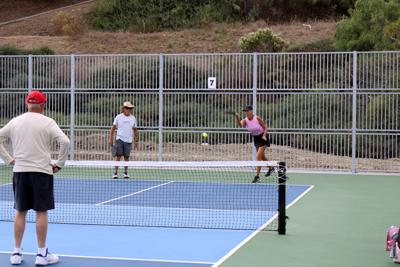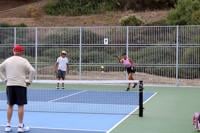The San Clemente City Council declined to move forward with a proposed fee schedule for usage of pickleball at Richard T. Steed Memorial Park at its Tuesday, April 16 meeting, instead unanimously opting to pursue further study.
Samantha Wylie, Beaches, Parks and Recreation Department Director, was directed to gather feedback from local stakeholders on a gamut of topics. In addition to the subjects of fees, reservations and holiday closures already considered in the city staff’s report, Wylie will obtain information on hosting tournaments at the eight-court facility, creating pickleball leagues, and pursuing revenue through a concession stand or retail shop.
The most significant parts of the feedback that councilmembers provided Tuesday night stated the proposed fees were too high and that having staff at Steed Park to monitor fees and reservations would be unnecessary.
Councilmember Rick Loeffler was one who vocalized that the listed fees were too much, while affirming the need for revenue to cover operational costs and support pickleball in San Clemente.
“Charging people to do anything, to pay to play, is not optimum,” he said. “It really is not, but we do have to look at revenue in the long term.”
At the council’s previous meeting in March, it directed Wylie to compose a fee study, during which staff considered affordability, equitable access, revenue generation and usage management, according to the staff report. Wylie returned with a model for open play and reservations that also accounted for the systems of other nearby cities.
“The adoption of proposed user fees will provide an estimated $629,200 in gross revenue annually, allowing cost recovery for overhead costs, as well as helping to defray the costs of the new pickleball facility,” the report stated.
Staff also projected the combination of maintenance costs and paying hourly staff to monitor San Gorgonio Park pickleball in addition to the proposed hours of operation at Steed Park would amount to $202,910 annually. Hourly staff wages at Steed would account for $151,000 of the total.
Wylie spoke about staff’s monitoring of San Gorgonio and Steed Park usage since Nov. 1, 2023, from which staff determined players used Steed for an average of 89 minutes and San Gorgonio for 68 minutes each time they came to play. Staff projected 80% of pickleball players would use Steed Park going forward.
The proposed fee schedule included a daily drop-in fee, a 30-day monthly pass, a 90-day seasonal pass, and an annual pass as membership options in which non-residents would have to pay marginally more than residents. Players would also be charged to reserve a court for a 90-minute block of time.
Additionally, the report included hours for open play that left time between noon and 4:30 p.m. on certain days for reservations. Steed would be open from 9 a.m.-9 p.m. Monday through Thursday, 6 a.m.-6 p.m. Friday, and 7 a.m.-6 p.m. on weekends; the park would be closed on Christmas and have alternate hours on Christmas Eve, New Year’s Eve, New Year’s Day, Easter, the Fourth of July, and Thanksgiving Day.
San Gorgonio Park’s regular hours of operation and reservation system would remain unchanged in the model.
Regarding the discussion of where the money from such fees would go, Councilmember Chris Duncan affirmed that the initiative wasn’t a money grab and that the city never intended to use solely its own funding for a permanent pickleball facility at Steed.
“This is an attempt to catch up with this large momentum that we’re seeing today and that we know about, about making sure we have the capacity to handle all the interest,” he said.
City Manager Andy Hall added that revenue from the Municipal Golf Course and the Aquatics Center also goes back into funding the operational costs of those facilities.
Wylie told the council that staff had previously been interested in hosting tournaments, but also said the city is still getting used to having the new facility under its watch before moving forward with other initiatives prior to Tuesday’s meeting.
She added that the city could provide concessions either by extending the usage of the city-operated concessions at the baseball fields or using the current restroom facility nearest the skate park and pickleball courts, which has a window roll-up but only has plumbing installed and is used for storage.
Councilmember Steve Knoblock said his concern is that pickleball needs to be at the right location in relation to minimizing noise impacts, adding that he hoped the city could continue focusing on Steed Park.
Fees should primarily affect non-residents, Knoblock continued, suggesting the city reduce the cost of paying for staff by having a part-drop-in and part-computerized scheduling system.
“If those courts during the computerized schedule time are not being used, the drop-in players (should be) free to use that space,” he said. “I’d like to see a bifurcation there, allowing a mechanism for both.”
Knoblock also recommended staff further analyze the costs of maintenance and of expanding Steed’s pickleball footprint to add three more courts, which members of the public suggested there is space available at the facility.
He said he’d prefer an “honor system” that he believes players would operate under, he supported the operation of a concession stand, and that he wasn’t prepared to proceed with the listed fees.
Mayor Victor Cabral echoed Knoblock’s final sentiments, adding jokingly that with his limited City Council stipend, he likely couldn’t afford the proposed schedule.
“Some people have said the status quo is perfect,” Cabral said of the many public speakers on Tuesday. “I think we need more input from everybody.”
He added that receiving input from individuals who have run tournaments and have experience around the sport, to find the right balance for everyone, would be beneficial.
Loeffler, who said he was sold on pickleball as a sport and as an outlet for socialization that isn’t going anywhere, reminded the public that San Clemente organizes only a few sports in which people don't have to pay to participate.
“The fact that (pickleball) is so popular – you’re selling the reason why we should have some participation from the residents,” he said.
Loeffler added that he supported the idea of a ‘pickleball committee,’ that he was intrigued by the prospect of hosting tournaments, and that the city should explore having them consistently while minimizing everyday players’ access.
Mayor Pro Tem Mark Enmeier said there was room for compromise, suggesting a system in which a limited number of courts are reservable during a certain time in the day. He also supported keeping the courts open on holidays, pickleball leagues, a professional store, tournaments, and other ways to generate revenue beyond a per-person fee.
There is no timetable for Wylie to meet with the community and come back with a new report.


